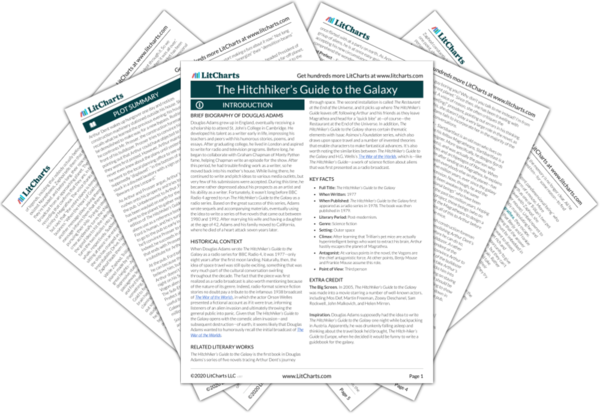The planet of Magrathea comes to stand for the kind of merciless greed that all too often plagues civilizations. Magrathea is an ancient planet populated by a species that made itself rich by designing custom-built luxury planets for wealthy clients. This market first arose when the Galactic economy was booming. As a result of the thriving market, almost everybody became quite rich. However, this unfortunately caused people to feel “rather dull and niggly,” thereby prompting them to examine their lives. What they determined when they turned a critical eye on their existences was that they weren’t happy with their home planets, so they started commissioning Magratheans to build them new ones that would satisfy their newly unquenchable desires. In this way, the planet also represents the ways in which wealth can corrupt happiness by providing people with the opportunity to endlessly pursue lives that seem—but aren’t necessarily—better than the ones they’re currently leading. Perfectly willing to exploit this niche market, the people of Magrathea set to work, eventually becoming so financially successful that they inadvertently threw the rest of the Galaxy into “abject poverty.” Because nobody could afford their services anymore, the Magratheans decided to hibernate until the economy regained its strength. This, of course, is a somewhat unethical decision, one that suggests Magratheans only care about money and not the wellbeing of individuals throughout the Galaxy.
Magrathea Quotes in The Hitchhiker’s Guide to the Galaxy
Many men of course became extremely rich, but this was perfectly natural and nothing to be ashamed of because no one was really poor—at least no one worth speaking of. And for all the richest and most successful merchants life inevitably became rather dull and niggly, and they began to imagine that this was therefore the fault of the worlds they’d settled on. None of them was entirely satisfactory: either the climate wasn’t quite right in the later part of the afternoon, or the day was half an hour too long, or the sea was exactly the wrong shade of pink.
And thus were created the conditions for a staggering new form of specialist industry: custom-made luxury planet building. The home of this industry was the planet Magrathea, where hyperspatial engineers sucked matter through white holes in space to form it into dream planets—gold planets, platinum planets, soft rubber planets with lots of earthquakes—all lovingly made to meet the exacting standards that the Galaxy’s richest men naturally came to expect.
This is a complete record of [the sperm whale’s] thought from the moment it began its life till the moment it ended it.
Ah…! What’s happening? it thought.
Er, excuse me, who am I?
Hello?
Why am I here? What’s my purpose in life?
What do I mean by who am I?
Calm down, get a grip now…oh! this is an interesting sensation, what is it? It’s a sort of…yawning, tingling sensation in my…my…well, I suppose I’d better start finding names for things if I want to make any headway in what for the sake of what I shall call an argument I shall call the world, so let’s call it my stomach.
[…] What’s this thing? This…let’s call it a tail—yeah, tail. Hey! I can really thrash it about pretty good, can’t I? Wow! Wow! That feels great! Doesn’t seem to achieve very much but I’ll probably find out what it’s for later on. Now, have I built up any coherent picture of things yet?
The car shot forward straight into the circle of light, and suddenly Arthur had a fairly clear idea of what infinity looked like.
It wasn’t infinity in fact. Infinity itself looks flat and uninteresting. Looking up into the night sky is looking into infinity—distance is incomprehensible and therefore meaningless. The chamber into which the aircar emerged was anything but infinite, it was just very very very big, so big that it gave the impression of infinity far better than infinity itself.












